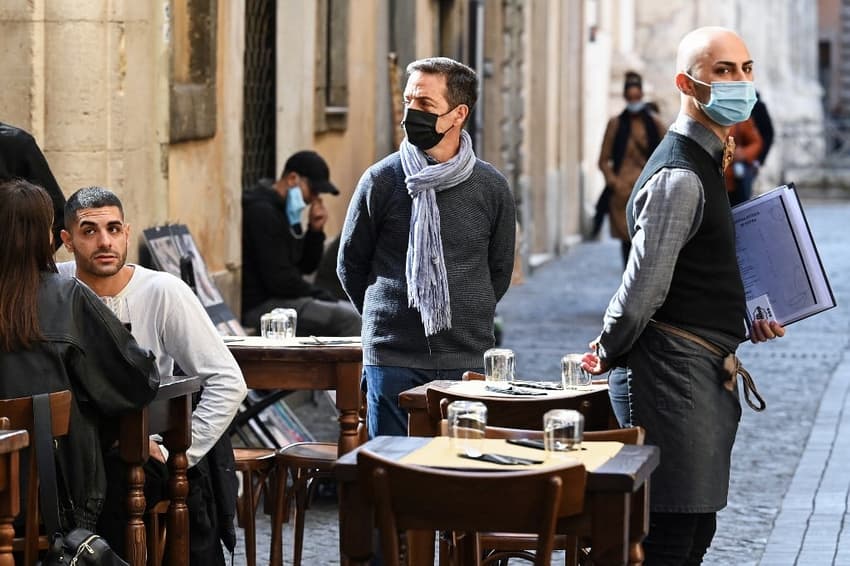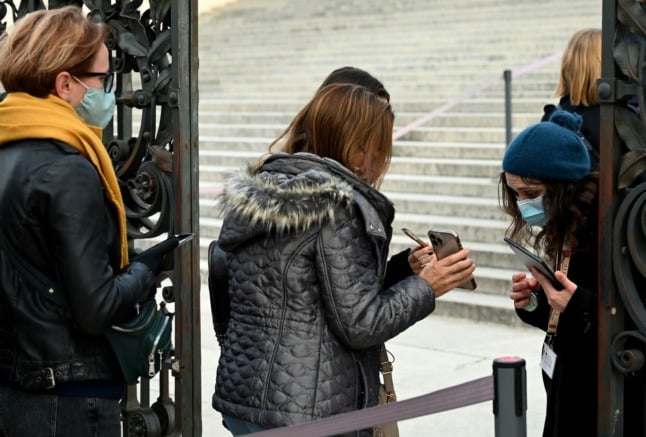At a glance: What Covid-19 rules are now in place in Italy?

Italy has scrapped a large number of its Covid restrictions, but that doesn't mean there aren't some measures still in place. Here's a recap of exactly what the rules are in Italy right now.
Italy's health ministry confirmed at the end of May it would be lifting the requirement for travellers to provide proof of vaccination, recovery, or a negative Covid test from June 1st.
That means that from the start of June, no Covid documentation is required to enter Italy (including the 'dPLF', or digital passenger locator form).
READ ALSO: LATEST: Italy scraps all Covid entry rules for travellers
On a national level, however, Italy has kept some health restrictions in place.
The decreto riapertura, or 'reopening decree', released in March, allowed for almost all of the country's Covid restrictions to be dropped on May 1st; but an ordinance released at the end of April amended the decree to keep certain restrictions in place until at least June 15th.
As the rules have changed several times in recent weeks, there has been considerable confusion about what exactly people should expect when visiting.
Here's an overview of Italy's most important Covid restrictions rules you need to know about.
Masks
As of May 1st, masks are no longer required for a large number of indoor venues, and aren't needed outdoors at all.
Bars, restaurants, hotels, shops, museums, galleries, gyms, swimming pools, spas, nightclubs and workplaces all no longer require any kind of mask (under national law - individual businesses may choose to impose their own, stricter rules).
Masks are still required on local and long-distance public transport; in health and social care environments, such as hospitals and residential homes; in schools; and in indoor entertainment venues, such as cinemas, theatres, concert halls, live music venues, and indoor sports arenas and stadiums.
READ ALSO: EXPLAINED: When do you still have to wear a mask outdoors in Italy?
High-grade Ffp2 masks are required on public transport (including planes, trains, ferries, buses, trams, coaches, school buses, trams and the metro) and in indoor entertainment venues; while lower-grade surgical masks are accepted in health and social care facilities and schools.
While the requirement to wear masks in indoor entertainment settings will be dropped as planned on June 15th, the health ministry is reportedly still deciding whether the deadline should be extended for public transport services.
Children under the age of six are exempt from all mask-wearing requirements.
Police can issue fines of between 400-1,000 euros to those who refuse to comply with the rules on wearing masks.
READ ALSO: Will Italy scrap the last Covid restrictions in June?
Green passes
As of May 1st, the requirement to show proof of vaccination or recent recovery from Covid (known in Italy as the 'green pass') to access most facilities and services has been dropped.
No health certificate of any kind is now needed to access almost all venues in Italy; the only exception being hospitals and care homes, which continue to require a 'super' or 'reinforced' green pass or its equivalent in the form of a foreign-issued vaccine or recovery certificate.
For entry into Italy from abroad, no Covid documentation of any kind is required as of June 1st.

People show their green passes outside a museum in Rome. Photo: Vincenzo Pinto/AFP
Venue capacity
Italy had lowered the maximum capacity of theatres, nightclubs, sports stadiums and other venues throughout the pandemic, but these rules ended on April 1st, meaning capacity has now been restored to 100 percent.
Travel to and within Italy
As of June 1st, Italy no longer requires arrivals to provide proof of vaccination, recovery, or a recent negative test result, following a press release from the ministry of health confirming that the requirement would not be extended beyond its expiry date of May 31st.
The requirement to fill out a dPLF (digital passenger locator form) was lifted on May 1st.
This means that from the start of June, travellers do not require any Covid-related documentation to enter the country.
See all the updated details about the rules on travel to Italy from your country on the government’s ‘Viaggiare Sicuri’ (travel safe) website.
READ ALSO: ‘Fit to fly’: Are Covid lateral flow tests valid for travel to Italy?
Within Italy, there are no restrictions on travel and movement between regions under current rules set by the national government, though local authorities can impose their own measures at any time.
Vaccine mandates
It's anticipated that the vaccine mandate currently in force for people in Italy aged over 50, as well as teachers and those in the emergency services and armed forces, will expire as planned on June 15th.
Vaccination will remain mandatory for hospital and care home workers up until the end of 2022. Failure to comply will be met with a €100 fine.
Please note that The Local cannot advise on specific cases. For more information about how the rules may apply to you, see the Italian health ministry’s website or consult the Italian embassy in your country.
Comments
See Also
Italy's health ministry confirmed at the end of May it would be lifting the requirement for travellers to provide proof of vaccination, recovery, or a negative Covid test from June 1st.
That means that from the start of June, no Covid documentation is required to enter Italy (including the 'dPLF', or digital passenger locator form).
READ ALSO: LATEST: Italy scraps all Covid entry rules for travellers
On a national level, however, Italy has kept some health restrictions in place.
The decreto riapertura, or 'reopening decree', released in March, allowed for almost all of the country's Covid restrictions to be dropped on May 1st; but an ordinance released at the end of April amended the decree to keep certain restrictions in place until at least June 15th.
As the rules have changed several times in recent weeks, there has been considerable confusion about what exactly people should expect when visiting.
Here's an overview of Italy's most important Covid restrictions rules you need to know about.
Masks
As of May 1st, masks are no longer required for a large number of indoor venues, and aren't needed outdoors at all.
Bars, restaurants, hotels, shops, museums, galleries, gyms, swimming pools, spas, nightclubs and workplaces all no longer require any kind of mask (under national law - individual businesses may choose to impose their own, stricter rules).
Masks are still required on local and long-distance public transport; in health and social care environments, such as hospitals and residential homes; in schools; and in indoor entertainment venues, such as cinemas, theatres, concert halls, live music venues, and indoor sports arenas and stadiums.
READ ALSO: EXPLAINED: When do you still have to wear a mask outdoors in Italy?
High-grade Ffp2 masks are required on public transport (including planes, trains, ferries, buses, trams, coaches, school buses, trams and the metro) and in indoor entertainment venues; while lower-grade surgical masks are accepted in health and social care facilities and schools.
While the requirement to wear masks in indoor entertainment settings will be dropped as planned on June 15th, the health ministry is reportedly still deciding whether the deadline should be extended for public transport services.
Children under the age of six are exempt from all mask-wearing requirements.
Police can issue fines of between 400-1,000 euros to those who refuse to comply with the rules on wearing masks.
READ ALSO: Will Italy scrap the last Covid restrictions in June?
Green passes
As of May 1st, the requirement to show proof of vaccination or recent recovery from Covid (known in Italy as the 'green pass') to access most facilities and services has been dropped.
No health certificate of any kind is now needed to access almost all venues in Italy; the only exception being hospitals and care homes, which continue to require a 'super' or 'reinforced' green pass or its equivalent in the form of a foreign-issued vaccine or recovery certificate.
For entry into Italy from abroad, no Covid documentation of any kind is required as of June 1st.

People show their green passes outside a museum in Rome. Photo: Vincenzo Pinto/AFP
Venue capacity
Italy had lowered the maximum capacity of theatres, nightclubs, sports stadiums and other venues throughout the pandemic, but these rules ended on April 1st, meaning capacity has now been restored to 100 percent.
Travel to and within Italy
As of June 1st, Italy no longer requires arrivals to provide proof of vaccination, recovery, or a recent negative test result, following a press release from the ministry of health confirming that the requirement would not be extended beyond its expiry date of May 31st.
The requirement to fill out a dPLF (digital passenger locator form) was lifted on May 1st.
This means that from the start of June, travellers do not require any Covid-related documentation to enter the country.
See all the updated details about the rules on travel to Italy from your country on the government’s ‘Viaggiare Sicuri’ (travel safe) website.
READ ALSO: ‘Fit to fly’: Are Covid lateral flow tests valid for travel to Italy?
Within Italy, there are no restrictions on travel and movement between regions under current rules set by the national government, though local authorities can impose their own measures at any time.
Vaccine mandates
It's anticipated that the vaccine mandate currently in force for people in Italy aged over 50, as well as teachers and those in the emergency services and armed forces, will expire as planned on June 15th.
Vaccination will remain mandatory for hospital and care home workers up until the end of 2022. Failure to comply will be met with a €100 fine.
Please note that The Local cannot advise on specific cases. For more information about how the rules may apply to you, see the Italian health ministry’s website or consult the Italian embassy in your country.
Join the conversation in our comments section below. Share your own views and experience and if you have a question or suggestion for our journalists then email us at [email protected].
Please keep comments civil, constructive and on topic – and make sure to read our terms of use before getting involved.
Please log in here to leave a comment.